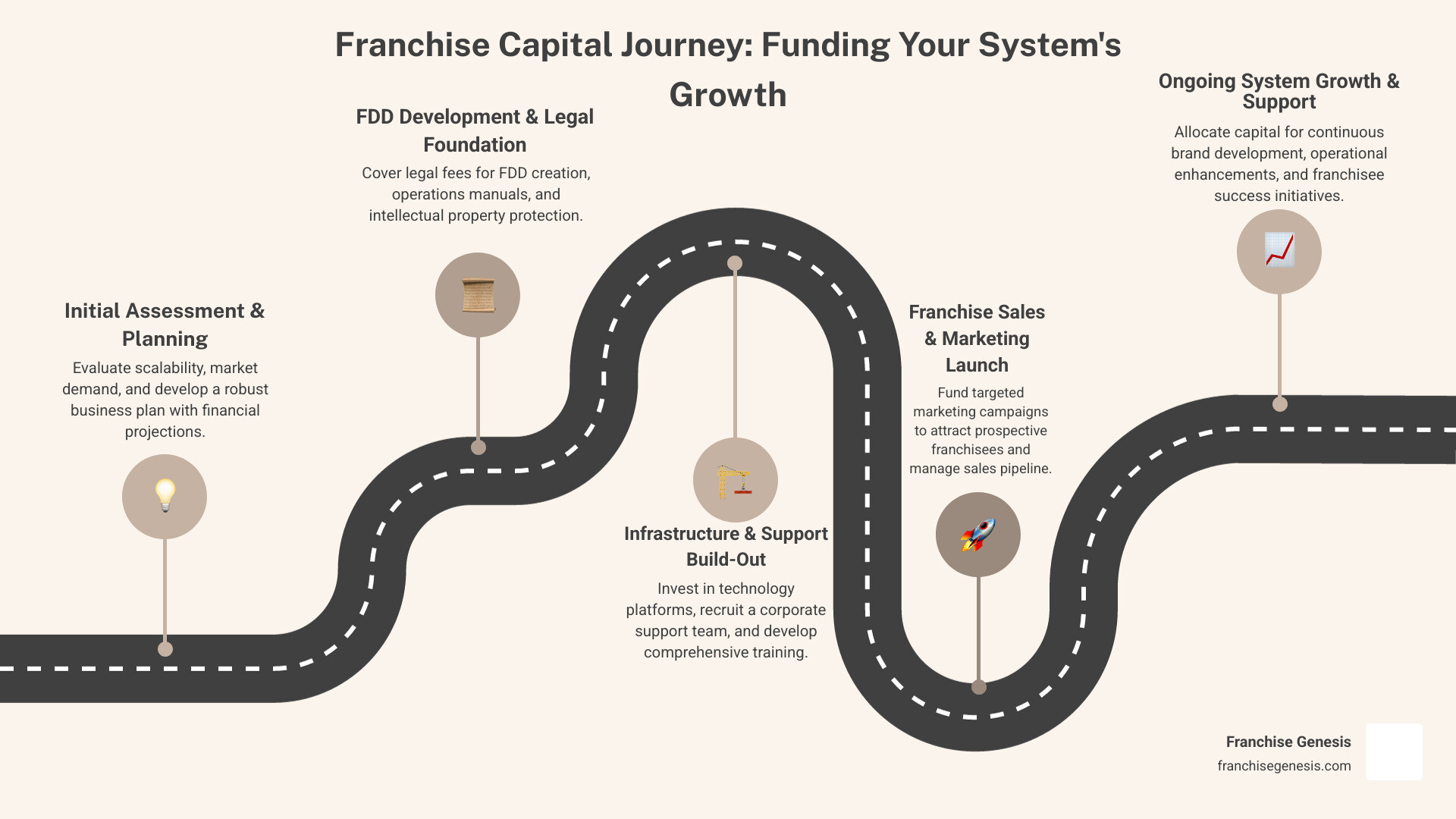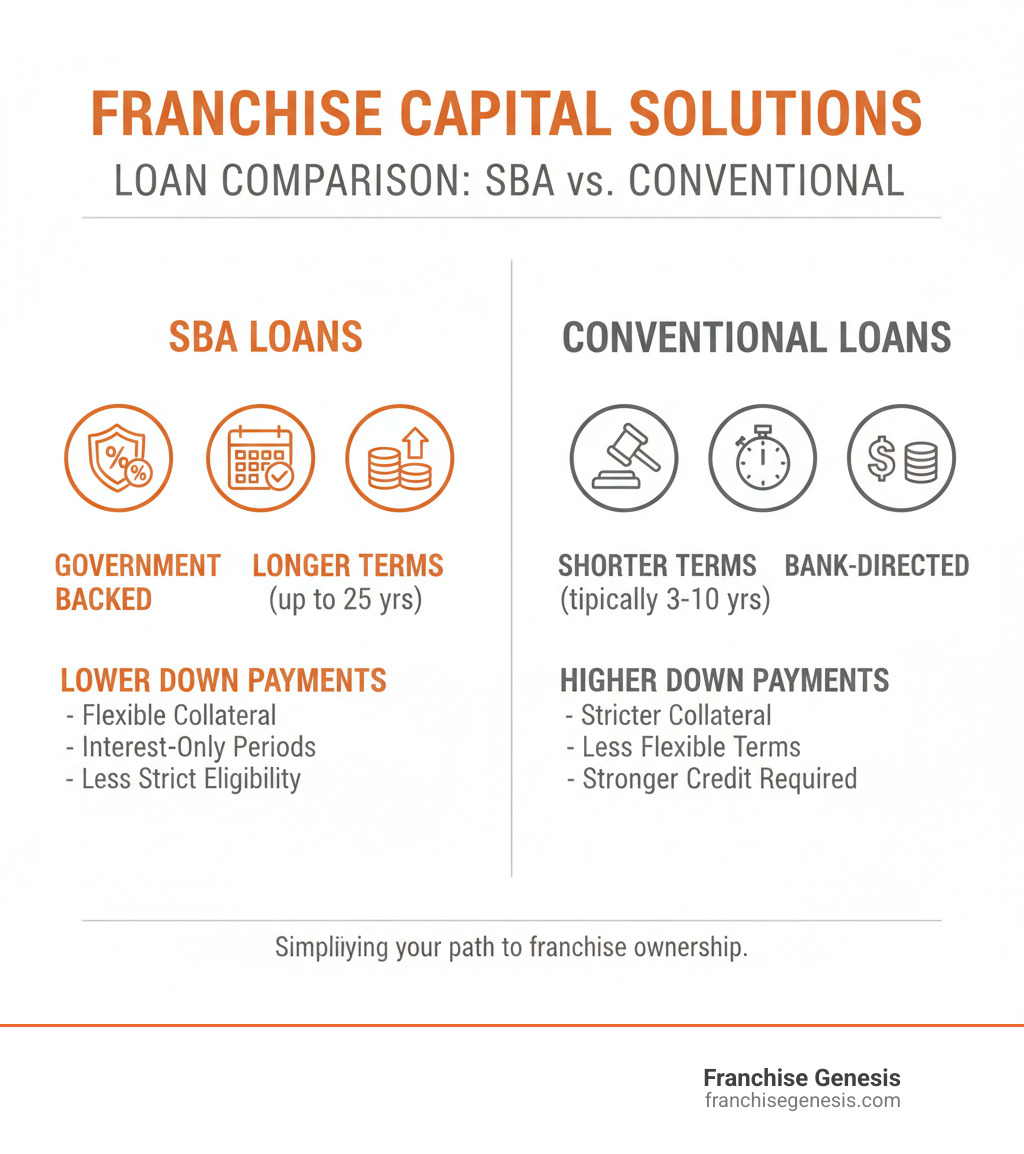Why Franchise Capital Solutions Are Critical for Business Expansion
Franchise capital solutions provide the essential funding needed to transform your successful business into a scalable franchise system. Whether you’re developing your Franchise Disclosure Document, building operational infrastructure, or supporting new franchisees, the right financing strategy can make or break your expansion plans.
Key Franchise Capital Solutions for Business Owners:
- Traditional Bank Loans – Conventional financing for established businesses with strong credit
- SBA Loans – Government-backed financing with lower down payments and longer terms
- Equipment Financing – Specialized loans for franchise technology and operational equipment
- Working Capital Lines – Flexible credit for ongoing operational expenses
- Alternative Funding – Options like retirement fund rollovers and revenue-based financing
The franchise industry has evolved significantly in recent years. Specialized franchise financing companies have emerged to bridge the gap between business owners and lenders, offering specialized expertise in matching franchisors with the right funding options. Their approach focuses on bringing lenders to you rather than forcing you to steer the complex lending landscape alone.
Understanding your capital needs early is crucial. Most new franchisors underestimate the initial investment required – from legal fees and FDD creation to marketing systems and ongoing support infrastructure. Having a clear financing strategy helps you scale sustainably without compromising quality or franchisee success.
As Monique Pelle-Kunkle, Vice President of Operations at Franchise Genesis, I’ve guided countless business owners through the franchising process, including securing the right franchise capital solutions to fuel their growth. My experience scaling franchise concepts across multiple markets has shown me that proper financing is the foundation of sustainable franchise expansion.

Similar topics to Franchise capital solutions:
Understanding the Capital Needs of a New Franchisor
Deciding to franchise your business is exciting, but let’s be honest – it’s also a bit like deciding to build a rocket ship when you’ve been running a bicycle shop. You’re not just expanding; you’re creating an entirely new system that needs to work flawlessly for every future franchisee who joins your brand.

The franchise capital solutions you’ll need are quite different from what you used to start your original business. Instead of funding one location, you’re building the infrastructure that will support dozens or even hundreds of future locations.
Your biggest initial investment will likely be creating your FDD – the Franchise Disclosure Document. Think of this as your franchise’s birth certificate, passport, and resume all rolled into one incredibly important (and expensive) document. Legal fees for FDD creation typically run into the tens of thousands because every detail must comply with federal and state regulations. Without it, you literally cannot sell a single franchise.
Next comes developing your operations manuals, which are essentially the instruction manual for running your business. These aren’t just guidelines – they’re the detailed playbook that ensures a customer in California gets the same experience as someone in Connecticut. Professional development of these manuals requires significant capital investment, but they’re what transforms your successful business into a replicable system.
Building a support team is another major capital requirement that many new franchisors underestimate. You’ll need dedicated staff for training new franchisees, providing ongoing operational support, and handling the specialized aspects of Franchise Sales Marketing. These are overhead costs you’ll carry before royalty revenues start flowing consistently.
Your technology infrastructure is equally crucial. From customer relationship management systems to online training platforms, the technology that supports your franchise system requires upfront investment. But this infrastructure is what allows you to efficiently manage and support multiple locations simultaneously.
Finally, there’s the ongoing capital needed for marketing your franchise opportunity itself. Attracting quality franchisees requires a sophisticated approach – you’re not just selling a product, you’re selling a business opportunity and a partnership.
As we detail in The Cost to Start a Franchise and Financing Options, understanding these capital needs isn’t just about budgeting. It’s about recognizing that each investment builds the foundation for your franchise system’s long-term success. The good news? With proper planning and the right financing strategy, these investments pay dividends as your franchise network grows and thrives.
Exploring Common Franchise Capital Solutions
When you’re ready to transform your successful business into a franchise, understanding your funding options becomes crucial. Franchise capital solutions for franchisors look quite different from what individual franchisees might seek. While franchisees need capital for their specific location’s build-out and launch, you as a franchisor need funding for something entirely different: building the system that will support dozens or even hundreds of future locations.
The landscape of franchisor funding offers several distinct loan types and financing avenues. Our comprehensive guide, Franchise Financing Options Complete Guide, explores these options in detail. What we’ve learned from working with countless franchisors is that a customized approach always works best. There’s no one-size-fits-all solution.
Companies that specialize in franchise financing often maintain extensive lender networks that can streamline your search for the right funding partner. These networks typically include traditional banks, credit unions, and alternative financing institutions – all familiar with the unique aspects of the franchise business model.
Your funding needs might vary widely. Perhaps you’re looking to finance new corporate training facilities, remodel existing spaces, acquire businesses to convert into your franchise model, or buy out a business partner. You might need to refinance existing debt or secure working capital to manage rapid growth. Even real estate purchases for corporate headquarters, ground leases, or equipment upgrades for central operations require dedicated financing strategies.
The key lies in matching your specific needs with the most appropriate loan product. Let’s explore the main categories of franchise capital solutions available to you.
Traditional Bank and Conventional Loans
Traditional bank loans remain a cornerstone of financing for established businesses entering the franchise space. If your business has a solid operating history, strong financial statements, and excellent credit, conventional loans from commercial banks and credit unions can offer attractive terms.
These loans work particularly well for franchisors who need to secure real estate for corporate offices or training facilities. We typically see loan terms ranging from three to ten years for general business purposes, extending up to 25 years when real estate is involved.
Building strong relationships with lenders makes a significant difference here. Banks prefer working with businesses they know and trust, so they’ll carefully examine your business history, management team, and financial projections. While conventional loans may require more collateral than government-backed alternatives, they often provide competitive rates and flexible terms for well-qualified franchisors.
The application process tends to be straightforward if you meet their criteria. Banks appreciate businesses with predictable cash flow and clear growth plans. For current market conditions and rate comparisons, check out our page on Franchise Loan Rates.
Government-Backed SBA Loans
For many aspiring franchisors, Small Business Administration (SBA) loans represent one of the most attractive franchise capital solutions available. The SBA doesn’t lend money directly but guarantees a portion of loans made by commercial lenders, which reduces risk for banks and makes them more willing to work with small businesses and emerging franchisors.
SBA 7(a) loans offer the most flexibility. You can use these funds for working capital, equipment purchases, real estate acquisition, or even refinancing existing debt. They typically feature longer repayment terms and lower down payments compared to conventional loans – a significant advantage when you’re building your franchise infrastructure.
SBA 504 loans focus specifically on major fixed assets like real estate or equipment. These loans involve two lenders and a Certified Development Company (CDC), creating a structure that can be particularly beneficial for large capital investments.
The government guarantee makes these loans more accessible to franchisors who might not qualify for conventional financing. Terms can extend up to ten years for general business purposes or 25 years for real estate, often with competitive interest rates.
While many people associate SBA loans with franchisees, franchisors can absolutely leverage these programs for corporate growth and infrastructure development. Our Franchise Financing SBA page provides deeper insights into how these programs work for franchise system builders.
Alternative Franchise Capital Solutions
The financing landscape has evolved dramatically, creating numerous alternative franchise capital solutions for franchisors with diverse needs or those who don’t fit traditional lending profiles. These options are gaining popularity as business owners seek more flexible funding approaches.
Working capital loans become essential when managing day-to-day operations during growth phases. As a franchisor, you might need this funding for initial marketing campaigns, expanding your corporate team, or covering expenses before royalty payments stabilize your cash flow.
Equipment financing offers a specialized solution for corporate operational needs. Whether you need technology for training centers, kitchen equipment for a culinary franchise’s corporate facility, or vehicles for field support, equipment loans use the assets themselves as collateral, making them more accessible.
Unsecured business lines of credit provide tremendous flexibility. Like a business credit card with higher limits and better terms, you can draw funds as needed and repay them, making this ideal for unexpected expenses or short-term cash flow gaps.
One particularly interesting option involves using retirement funds for business financing through 401(k) or IRA rollover programs. Sometimes called “ROBS” (Rollovers as Business Startups), this strategy lets you invest retirement savings into your business without taxes or early withdrawal penalties. Your retirement account essentially becomes your funding source, potentially offering faster approval and eliminating interest payments to external lenders. While these programs require careful planning and adherence to specific rules, they can provide funding in as little as ten business days.
Crowdfunding represents another emerging option where you raise smaller amounts from many individuals, often through online platforms. This approach can help you engage your community or potential franchisees while building brand loyalty and securing necessary capital.
These diverse alternatives mean that with proper guidance, virtually every franchisor can find a path to the capital they need for successful system development.
How to Prepare Your Business for Financing
Getting approved for the right franchise capital solutions goes beyond simply filling out an application. Think of it like preparing for the most important business meeting of your life – because in many ways, that’s exactly what it is.

Your solid business plan becomes your most powerful tool in this process. This isn’t just paperwork – it’s your chance to tell the compelling story of why your business deserves to become a franchise system. Lenders want to see that you truly understand your market, your competition, and most importantly, your path to success. They’re not just lending to your current business; they’re investing in your vision of what it can become.
Financial projections carry enormous weight in your application. These numbers need to paint a realistic picture of your franchise system’s future, showing steady growth without being overly optimistic. Smart lenders can spot inflated projections from miles away. Instead, focus on conservative estimates backed by solid research and market data. Include projections for both your corporate operations and how your future franchisees will perform – after all, their success directly impacts your royalty income.
Your credit score importance cannot be overstated. Both personal and business credit scores serve as your financial report card. Lenders use these scores as a quick way to assess how responsibly you’ve managed money in the past. If you find any issues during your credit review, address them well before applying for financing. Sometimes a few months of focused credit improvement can save you thousands in interest over the life of your loan.
Having a comprehensive documentation checklist ready shows lenders you’re organized and serious about your business. This includes your business plan with detailed projections, personal and business financial statements, tax returns for the past three to five years, legal entity documents, key management team resumes, and if you’ve already created it, your Franchise Disclosure Document. Our Franchising Business Complete Guide walks you through exactly what you’ll need to have ready.
The key is being prepared before you need the money. Scrambling to gather documents while you’re cash-strapped puts you in a weak negotiating position. Start this preparation process early, and you’ll approach lenders from a position of strength.
The Role of a Franchise Capital Solutions Provider
Navigating franchise financing can feel like learning a foreign language while blindfolded. This is where specialized franchise capital solutions providers become invaluable partners in your journey.
These experts bring expert guidance that goes far beyond what a typical loan broker might offer. They understand the unique challenges franchisors face – from managing initial development costs to supporting franchisee success. Many have walked in your shoes, having managed multi-unit operations or worked directly in franchise finance. This real-world experience helps them structure your financing request in ways that resonate with lenders.
The lender matching process becomes much more strategic with their help. Rather than you cold-calling dozens of banks and getting rejected by institutions that don’t understand franchising, these providers know which lenders actively seek franchise clients. They understand that a community bank in Ohio might love restaurant concepts, while a national lender specializes in service-based franchises. This targeted approach saves you time and increases your approval odds significantly.
Simplifying applications might sound basic, but it’s where many business owners stumble. These providers help you present your story in the most compelling way possible. They know which financial ratios lenders focus on, how to explain seasonal fluctuations in your business, and how to position your franchise development plans as strengths rather than risks.
Perhaps most valuable is their ability to structure creative loan structures. Standard bank loans often don’t fit the unique needs of growing franchise systems. Specialized providers can arrange financing with flexible collateral options, interest-only periods during your development phase, or even cash-out options that let you access equity you’ve built in your business.
Their industry specialization means they speak the same language as franchise-focused lenders. They understand concepts like royalty streams, franchise development fees, and multi-unit development agreements. When they present your deal to lenders, there’s no need to explain basic franchise concepts – they can focus on why your specific brand will succeed. For more insights into how these specialized companies operate, check out our guide on Franchise Financing Companies.
Key Loan Features to Evaluate
When comparing different franchise capital solutions, looking only at interest rates is like buying a car based solely on its color. The real value lies in understanding how all the loan features work together to support your business goals.

Competitive rates matter, but understanding the difference between fixed and variable rates matters more. Fixed rates give you predictable monthly payments, making budgeting much easier as you develop your franchise system. Variable rates might start lower, but they can increase over time. If you’re risk-averse or operating on tight margins, fixed rates often provide better peace of mind.
Flexible terms can make or break your cash flow. Longer terms mean lower monthly payments, which can be crucial during your initial franchise development phase when you’re investing heavily but not yet receiving substantial royalty income. However, longer terms also mean paying more interest over the life of the loan. The sweet spot depends on your projected cash flow and growth timeline.
Interest-only periods can be a lifesaver for developing franchisors. These periods let you pay only the interest for a set time, freeing up cash for essential investments like marketing, training systems, or support staff. This flexibility can be the difference between struggling through your development phase and thriving during it.
Collateral options require careful consideration. Traditional lenders often want real estate or equipment as security, but franchise-focused lenders understand that your most valuable assets might be your brand, your systems, and your franchise agreements. Some lenders will accept multi-unit development commitments or even your FDD as part of the collateral package.
Prepayment penalties might seem irrelevant now, but they can become costly later. If your franchise system takes off faster than expected, you might want to refinance at better terms or pay off your loan early. Penalties for doing so can cost thousands of dollars unnecessarily. Many specialized franchise lenders avoid these penalties entirely, understanding that successful franchisors often want to optimize their capital structure as they grow.
The best loan features for your situation depend on your risk tolerance, growth timeline, and cash flow projections. A knowledgeable franchise capital solutions provider will help you weigh these factors and negotiate terms that support your long-term success rather than just getting you approved.
Frequently Asked Questions about Funding Your Franchise System
How much capital do I need to franchise my business?
This is probably the first question every business owner asks when they start thinking about franchising, and honestly, it’s not a simple answer. The capital you’ll need depends heavily on your industry, how complex your operations are, and the level of support you want to provide your future franchisees.
Let me break down the typical costs you should expect. Legal fees for creating your Franchise Disclosure Document (FDD) will likely be your biggest single expense, ranging from $25,000 to $75,000 or more. This varies based on your legal counsel and how many states you plan to register in initially.
Next, you’ll need to invest in developing comprehensive operations manuals and training programs. Add a robust technology platform with CRM systems and online portals, and you’re looking at another $15,000 to $50,000. Your initial marketing efforts to attract those first crucial franchisees might cost $10,000 to $30,000.
Here’s what many business owners don’t anticipate: you’ll need substantial working capital to support your corporate team and operations before royalty income starts flowing consistently. This could be anywhere from $50,000 to $200,000 for the first 12-24 months, depending on your growth timeline.
When you add it all up, the initial investment to properly launch a franchise system typically ranges from $100,000 to $400,000, not including ongoing operational costs. I know that might seem daunting, but remember – these aren’t just expenses, they’re investments in building a strong foundation that will attract quality franchisees and ensure long-term success.
For a deeper dive into these numbers, check out our detailed guide on franchise startup costs.
Can I help my future franchisees find financing?
Absolutely, and I can’t stress enough how important this is! While you won’t be lending money directly to your franchisees (that gets complicated from a regulatory standpoint and requires massive capital), establishing a preferred lender program should be a cornerstone of your franchisee support system.
Think of it this way: when you’ve built relationships with third-party lenders who already know and trust your brand, you’re essentially rolling out the red carpet for your franchisees. These lenders understand your business model, they’ve likely already reviewed your FDD, and they’re eager to fund your concept.
This indirect support becomes a powerful competitive advantage. Your franchisees get easier access to capital with less stress and faster approval times. You get more units opening quicker, which means faster system growth and increased royalty income. It’s truly a win-win situation.
I’ve seen this make the difference between a franchisee who opens in 90 days versus one who struggles for months trying to steer financing on their own. That kind of support attracts top-tier franchisees who recognize the value of a franchisor who’s thinking about their success from day one.
What’s the difference between funding for a franchisor vs. a franchisee?
This is a crucial distinction that often confuses business owners new to franchising. The funding needs are completely different because you’re solving different problems.
Franchisor funding is all about building the engine that powers your entire franchise network. You’re investing in system development – those legal fees for your FDD, protecting your intellectual property, and creating comprehensive operations manuals and training programs that ensure consistency across all locations.
You’ll also need capital for franchise sales and marketing to attract quality franchisees. This means funding campaigns, attending franchise expos, and building your sales infrastructure. Then there’s your corporate infrastructure – establishing headquarters, hiring your support team for operations, marketing, training, and real estate, plus investing in scalable technology systems.
Don’t forget about working capital to cover your overhead and operational costs before that steady royalty income kicks in. Essentially, you’re building the foundation that will support hundreds of future franchise locations.
Franchisee funding, on the other hand, focuses on launching and operating a single unit. They need money for their franchise fee, real estate costs including build-out, equipment and inventory, working capital for initial operations, and training and grand opening expenses.
Understanding both sides is critical for your success as a franchisor. While you’re securing franchise capital solutions for your system’s growth, you also need to deeply understand what your franchisees face in their funding journey. The better you can guide them toward successful financing, the stronger your entire system becomes.
This knowledge helps you structure your franchise offering more effectively and provide the kind of support that sets exceptional franchisors apart from the rest.
Conclusion: Partnering for Sustainable Franchise Growth

Changing your successful business into a thriving franchise system is one of the most exciting growth strategies available today. But as we’ve explored throughout this guide, it requires more than just a great concept and entrepreneurial spirit – it demands a smart financial strategy backed by the right capital solutions.
The world of franchise capital solutions offers remarkable flexibility for business owners ready to scale. Whether you’re drawn to the stability of traditional bank loans, the favorable terms of SBA financing, or the creative possibilities of alternative funding like retirement fund rollovers, there’s a path that fits your unique situation and growth timeline.
Preparation truly is your secret weapon in this process. When you walk into a lender’s office with a comprehensive business plan, realistic financial projections, and organized documentation, you’re not just applying for a loan – you’re presenting a compelling investment opportunity. This level of preparation opens doors to better terms, more flexible arrangements, and faster approval processes.
The beauty of working with specialized franchise capital solutions providers lies in their deep understanding of your journey. They’ve walked alongside countless business owners who’ve faced the same challenges you’re navigating now. Their expertise in lender matching, creative loan structuring, and industry-specific guidance can save you months of research and countless hours of applications to unsuitable lenders.
At Franchise Genesis, we’ve seen how the right financial foundation transforms good businesses into exceptional franchise systems. Our approach to Accelerated Brand Growth recognizes that franchisor success and franchisee success are deeply connected – and both depend on having access to appropriate capital at the right moments.
Your franchise journey doesn’t have to be a solo adventure. The combination of proper financing and expert guidance creates a powerful foundation for sustainable growth that benefits everyone in your system – from your corporate team to your future franchisees and the communities they’ll serve.
Ready to turn your business expansion dreams into reality? Learn more about our services for franchisors and find how we can help you build the franchise system you’ve always envisioned.
